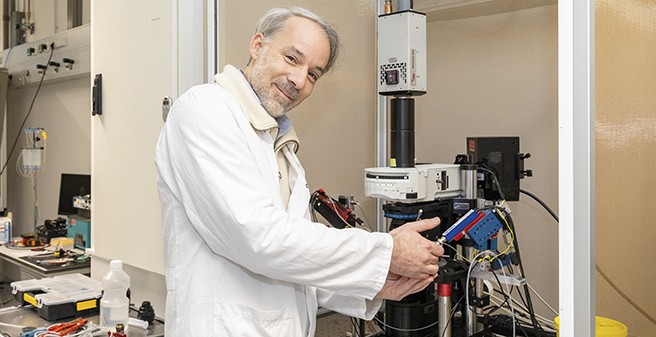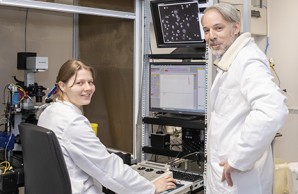Summit Seeker from Vienna
How does pain arise, and where can we find the switch to turn it off? These are the questions that have guided Professor Dr. Stefan Lechner's research across nearly all corners of Germany. After academic stints in Berlin and Heidelberg, the Austrian scientist has been exploring the origins of pain in Hamburg since 2021. What does he miss most in the flat expanses in northern Germany? The picturesque mountains, of course.
Text: Nicole Sénégas-Wulf, Photos: Eva Hecht
His mountain bike, once a faithful companion on the winding trails around Vienna, now gathers dust in the basement. “I miss the elevation and those tight, thrilling curves,” he chuckles. Nevertheless, the decision to move from Heidelberg to Hamburg is one he has never regretted. “Quite the opposite—I’ve enjoyed every relocation. Each new place has been a chance to try something different, to keep my mind fresh,” he says. True settling in, though, only happened last summer when his family joined him in Hamburg. “Now that I’m no longer commuting, I have more time to explore the city,” he shares. His favourite spots? The Portuguese Quarter located between the Michel, the harbour, and the Landungsbrücken, where he and his wife enjoy dining out. He’s also discovered Hamburg’s cultural offerings, from concerts to exhibitions. Even the waterways have lured him out on a stand-up paddle board (SUP). How did it go? “Let’s just say I’m much more skilled on skis,” he jokes. “Luckily, the canals are mostly straight, so I haven’t fallen in yet!”
What has remained constant throughout his journey is his focus on pain research. “Pain is the most common reason people visit a doctor. It accompanies nearly all illnesses, yet we still don’t fully understand it,” explains Prof. Lechner. Pain is elusive—manifesting differently and defying easy measurement. To tackle it at its root, Prof. Lechner and his ten-member team at UKE, which is affiliated with the Department of Anesthesiology, are studying the peripheral nervous system—specifically, the nerve fibres where pain originates. “We want to understand how nerve fibres become more sensitive after inflammation or injury, and how we can selectively block the resulting pain,” he says. Their work has uncovered a special class of pain receptors: silent nociceptors. These “sleepers” only activate when triggered by pain stimuli. “This effectively doubles or triples the number of nerve fibres transmitting pain signals to the spinal cord.”
Pain research is especially close to the scientist's heart because there is still so much to discover in this field. “The core problem is that we still rely on just two major classes of painkillers. Opioids, used since ancient Egyptian times, and nonsteroidal anti-inflammatory drugs like ibuprofen or aspirin,” he explains. Both come with significant side effects and blanket the pain rather than targeting it precisely. “Genetic experiments show that different types of pain are detected by distinct nerve fibres. That gives us hope for developing painkillers tailored to specific pain types.”
The world of science has captivated Prof. Lechner since childhood. “As a kid, I loved watching the American series MacGyver. Seeing him solve impossible problems with a few random items was fascinating,” he recalls. While his own tools are far removed from those of a TV secret agent, the drive to solve puzzles endures. "We measure the neural activity of nerve fibres using electrophysiology. Additionally, at our research campus, we have access to one of the few super-resolution Minflux microscopes, which allows us to push the boundaries of what can be observed."
What’s next on his Hamburg adventure? “I’m still hunting for the ultimate urban retreat,” he laughs. When wanderlust strikes, he heads back to Vienna or the family’s holiday home near Salzburg. “Sure, there are no peaks to conquer in Hamburg, but I’m more than happy here,” he concludes. Even the flat countryside has grown on this passionate summit seeker.

